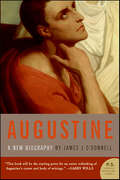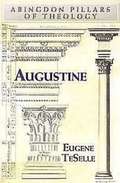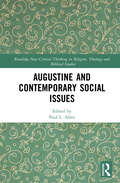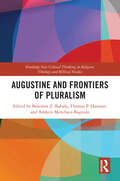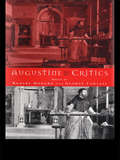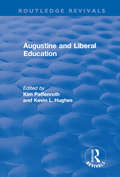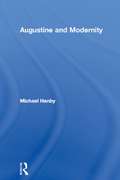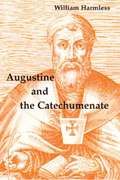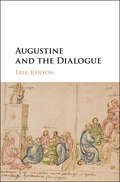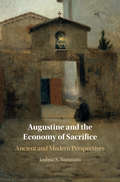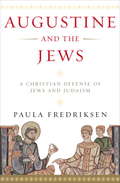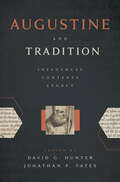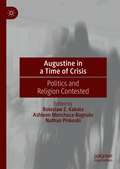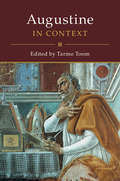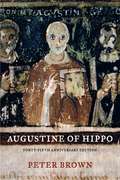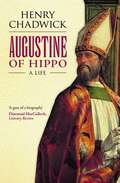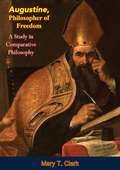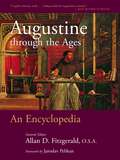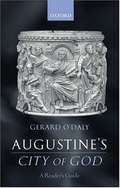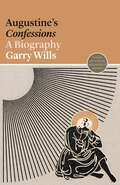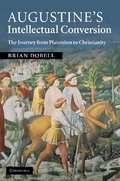- Table View
- List View
Augustine: A New Biography
by James J. O'DonnellSaint Augustine -- the celebrated theologian who served as Bishop of Hippo from 396 C.E. until his death in 430 C.E. -- is widely regarded as one of the most influential thinkers in the Western world. His autobiography, Confessions, remains among the most important religious writings in the Christian tradition. In this eye-opening and eminently readable biography, renowned historical scholar James J. O’Donnell picks up where Augustine himself left off to offer a fascinating, in-depth portrait of an unparalleled politician, writer, and churchman in a time of uncertainty and religious turmoil.Augustine is a triumphant chronicle of an extraordinary life that is certain to surprise and enlighten even those who believed they knew the complex and remarkable man of God.
Augustine: Self, Context, And Theology In Interpretation (Abingdon Pillars of Theology)
by Eugene TeselleAbingdon Pillars of Theology is a series for the college and seminary classroom designed to help students grasp the basic and necessary facts, influence, and significance of major theologians. Written by major scholars, these books will outline the context, methodology, organizing principles, method, primary contributions, and major writings of people who have shaped theology as we know it today. For many, all theology subsequent to Augustine is a footnote. He is influential, even today, because of his doctrinal formulations, but even more important, Augustine is a stimulating thinker and constant inquirer. Starting with his philosophical interest in Platonism, which set the framework for his thinking, Eugene TeSelle examines the major themes of Augustine's thought following a more or less chronological order including human fulfillment, evil, creation, the human self, the church and its doctrines, the course of human history, and the relation of Christianity to political matters. Even those who think he was wrong in his conclusions can respect Augustine's willingness to confront problems and think through their implications. "This book on Augustine allows the reader to appreciate how easily one moves from the fourth or fifth century into modern times and back. Eugene TeSelle thus invites the reader to appreciate some of the most significant themes of Augustine's thought--opening a kind of dialogue between Augustine and other thinkers on topics such as evil and grace, politics and piety, and more." Allan Fitzgerald, O.S.A., Istituto Patristico "Augustinianum," Rome, Italy "This is an extraordinary book. Eugene TeSelle is one of the great masters of Augustine's thought, and here he draws upon his great erudition to present the father of Western theology cogently and comprehensively for the layperson. The book is at once short and accessible but also profound and thought-provoking; a sensitive treatment of Augustine in his own context, which also makes him wholly relevant for today. TeSelle raises the big questions and provides ample material to begin to answer them." Carol Harrison, Lecturer in the History and Theology of the Latin West, University of Durham, Durham, Great Britain Eugene TeSelle is emeritus Oberlin Alumni/ae Professor of Church History and Theology at Vanderbilt University in Nashville, Tennessee.
Augustine and Contemporary Social Issues (Routledge New Critical Thinking in Religion, Theology and Biblical Studies)
by Paul L. AllenThis book focuses on applying the thought of Saint Augustine to address a number of persistent 21st-century socio-political issues. Drawing together Augustinian ideas such as concupiscence, virtue, vice, habit, and sin through social and textual analysis, it provides fresh Augustinian perspectives on new—yet somehow familiar—quandaries. The volume addresses the themes of fallenness, politics, race, and desire. It includes contributions from theology, philosophy, and political science. Each chapter examines Augustine’s perspective for deepening our understanding of human nature and demonstrates the contemporary relevance of his thought.
Augustine and Frontiers of Pluralism (Routledge New Critical Thinking in Religion, Theology and Biblical Studies)
by Boleslaw Z. Kabala, Thomas P. Harmon, and Ashleen Menchaca-BagnuloThis book focuses on St. Augustine as a worthwhile resource for thinking through the challenges and prospects of pluralism. The contributors speak to several dimensions of this organizing concept, understanding of which is advanced by engagement with Augustine. The volume brings together scholars from different disciplines, faith traditions, and political commitments, all of whom have deemed it worthwhile to return to Augustine to learn about a signature theme of common life in the twenty-first century. The chapters address a variety of topics including civic engagement, feminism, Black religious thought, domination, liberalism, and time. In an age of pluralism, the hope is to access the insights of the thinker who struggled with a plurality of desires, motivations, and political-theological imaginations, and to benefit from his thoughts. The book will be of particular interest to scholars of theology, philosophy, and political science.
Augustine and his Critics: Essays In Honour Of Gerald Bonner (Christian Origins Ser.)
by Robert Dodaro George LawlessAugustine of Hippo (AD 354-430) is arguably the most controversial Christian thinker in history. His positions on philosophical and theological concerns have been the subjects of intense scrutiny and criticism from his lifetime to the present.Augustine and his Critics gathers twelve specialists' responses to modern criticisms of his thought, covering: personal and religious freedom; the self and God; sexuality, gender and the body; spirituality; asceticism; cultural studies; and politics.Stimulating and insightful, the collection offers forceful arguments for neglected historical, philosophical and theological perspectives which are behind some of Augustine's most unpopular convictions.
Augustine and Liberal Education (Augustine In Conversation: Tradition And Innovation Ser.)
by Kim Paffenroth Kevin L. HughesThis title was first published in 2000: Augustine of Hippo (354-430 CE) - Bishop, theologian, philosopher, and rhetorician - has left a rich legacy for reflection upon relationships between Christianity and culture, between Christian catechesis and liberal education, and between faith and reason. Contemporary educational institutions have begun to explore their roots, digging into their intellectual traditions for the resources for renewal of liberal education. Augustine and Liberal Education sheds light on liberal education past and present, from an Augustinian point of view. Ranging from historical investigations of particular themes and issues in the thought of Saint Augustine, to reflections on the role of tradition and community and the challenges and opportunities facing universities in the next century, the contributors return to the sources of traditional reflection whilst exploring contemporary issues of education and 'the good life'. Essays on Augustinian inquiry in medieval and modern eras address critical questions on the role of rhetoric, reading, and authority in education, on the social context of learning, and on the relationship between liberal education and properly Christian catechesis. Contemporary questions on liberal education from philosophical, political, theological, and ethical perspectives are then explored in the essays which move from the past to the present. This book offers a valuable contribution to the growing scholarship on Catholic universities and on Augustine of Hippo, engaging in 'Augustinian inquiry' and pointing to possibilities for renewal in liberal education in the twenty-first century.
Augustine and Modernity (Routledge Radical Orthodoxy)
by Michael HanbyAugustine and Modernity is a fresh and challenging addition to current debates about the Augustinian origins of modern subjectivity and the Christian genesis of Western nihilism. It firmly rejects the dominant modern view that the modern Cartesian subject, as an archetype of Western nihilism, originates in Augustine's thought. Arguing that most contemporary interpretations misrepresent the complex philosophical relationship between Augustine and modern philosophy, particularly with regard to the work of Descartes, the book examines the much overlooked contribution of Stoicism to the genealogy of modernity, producing a scathing riposte to commonly-held versions of the 'continuity thesis'. Michael Hanby identifies the modern concept of will that emerges in Descartes' work as the product of a notion of self more proper to Stoic theories of immanence than to Augustine's own rigorous understandings of the Trinity, creation, self and will. Though Augustine's encounter with Stoicism ultimately resulted in much of his teaching being transferred to Descartes and other modern thinkers in an adulterated form, Hanby draws critical attention to Augustine's own disillusionment with Stoicism and his interrogation of Stoic philosophy in the name of Christ and the Trinity. Representing a new school of theology willing to engage critically with other disciplines and to challenge their authority, Augustine and Modernity offers a comprehensive new interpretation of De Trinitate and of Augustinian concepts of will and soul. Revealing how much of what is now thought of as 'Augustinian' in fact has its genealogy in Stoic asceticism, it interprets the modern nihilistic Cartesian subject not as a logical consequence of a true Christian Trinitarian theology, but rather of its perversion and abandonment.
Augustine and the Catechumenate
by William HarmlessThis study examines a little-known side of Augustine: his work as a teacher of candidates for baptism. It reconstructs in vivid detail the experience of the ancient catechumenate for the better clarification and implementation of the present process.
Augustine and the Dialogue
by Erik KenyonContrary to the scholarly consensus, Augustine and the Dialogue argues that Augustine's dialogues, with their inconclusive debates and dramatic shifts in focus, betray a sophisticated pedagogical method which combines strategies for 'un-learning' and self-reflection with a willingness to proceed via provisional answers. By shifting the focus from doctrinal content to questions of method, Kenyon seeks to reframe scholarly discussions of Augustine's earliest surviving body of works. This approach shows the young Augustine not refuting so much as appropriating Academic skeptical practices. It also shows that the dialogues' few scriptural references, e.g. Wisdom 11:20's 'measure, number, weight', come at key structural points. This helps articulate the dialogues' larger project of cultivating virtue and their approach to philosophy as a form of purification. Augustine is shown to be at home with pluralistic approaches, and Kenyon holds up his methodology as an attractive model for thinking through problems of the liberal academy today. Addresses fundamental questions about the purpose and method of Augustine's dialogues. Examines questions of continuity across Augustine's dialogues from a new perspective focused on methodology. Explores Augustine's self-presentation as writing dialogues in the 'Academic' tradition of Plato, Cicero and Plotinus.
Augustine and the Economy of Sacrifice: Ancient and Modern Perspectives
by Joshua S. NunziatoBusiness is generally viewed as a means to generate personal or corporate wealth, but business transactions can also sacrificially serve the common good. In conversation with contemporary social theorists, Joshua S. Nunziato in this book critically evaluates the spiritual significance and aims of economic exchange. Inspired by Augustine's vision of the Church as a 'universal sacrifice', he explores how Augustine's approach teaches us detachment - both personal and collective - which releases us from illusory claims of ownership and reframes business as an exercise in loving and letting go. Nunziato's volume engages with the big questions of economic life and considers both why and how we acknowledge people through business in a way that results in collective well-being. It will be of interest to scholars and students of Augustinian studies, philosophy of exchange, and economic ethics.
Augustine and the Jews
by Paula FredriksenFredriksen (scripture, Boston U. ) places the third-century AD Augustine's defense of Jews in the context of the long history of the Greco-Roman Mediterranean civilization from the conquests of Alexander the Great in the forth century BCE to the beginning of the twilight of the western Christian empire in fifth-century. From there, she narrows her focus first to Augustine's life and thought, and again to the evolution and revolution of his theology of Jews and Judaism. Annotation ©2009 Book News, Inc. , Portland, OR (booknews. com)
Augustine and the Trinity
by Lewis AyresAugustine of Hippo (354-430) strongly influenced western theology, but he has often been accused of over-emphasizing the unity of God to the detriment of the Trinity. In Augustine and the Trinity, Lewis Ayres offers a new treatment of this important figure, demonstrating how Augustine's writings offer one of the most sophisticated early theologies of the Trinity developed after the Council of Nicaea (325). Building on recent research, Ayres argues that Augustine was influenced by a wide variety of earlier Latin Christian traditions which stressed the irreducibility of Father, Son and Spirit. Augustine combines these traditions with material from non-Christian Neoplatonists in a very personal synthesis. Ayres also argues that Augustine shaped a powerful account of Christian ascent toward understanding of, as well as participation in the divine life, one that begins in faith and models itself on Christ's humility.
Augustine and Tradition: Influences, Contexts, Legacy
by David G. Hunter, Jonathan P. YatesAn indispensable resource for those looking to understand Augustine&’s place in religious and cultural heritage Augustine towers over Western life, literature, and culture—both sacred and secular. His ideas permeate conceptions of the self from birth to death and have cast a long shadow over subsequent Christian thought. But as much as tradition has sprung from Augustinian roots, so was Augustine a product of and interlocutor with traditions that preceded and ran contemporary to his life. This extensive volume examines and evaluates Augustine as both a receiver and a source of tradition. The contributors—all distinguished Augustinian scholars influenced by J. Patout Burns and interested in furthering his intellectual legacy—survey Augustine&’s life and writings in the context of North African tradition, philosophical and literary traditions of antiquity, the Greek patristic tradition, and the tradition of Augustine&’s Latin contemporaries. These various pieces, when assembled, tell a comprehensive story of Augustine&’s significance, both then and now.Contributors: Alden Bass, Michael Cameron, John C. Cavadini, Thomas Clemmons, Stephen A. Cooper, Theodore de Bruyn, Mark DelCogliano, Geoffrey D. Dunn, John Peter Kenney, Brian Matz, Andrew McGowan, William Tabbernee, Joseph W. Trigg, Dennis Trout, and James R. Wetzel.
Augustine Deformed
by John M. RistAugustine established a moral framework that dominated Western culture for more than a thousand years. His partly flawed presentation of some of its key concepts (love, will and freedom), however, prompted subsequent thinkers to attempt to repair this framework, and their efforts often aggravated the very problems they intended to solve. Over time, dissatisfaction with an imperfect Augustinian theology gave way to increasingly secular and eventually impersonal moral systems. This volume traces the distortion of Augustine's thought from the twelfth century to the present and examines its consequent reconstructions. John M. Rist argues that modern philosophies should be recognized as offering no compelling answers to questions about the human condition and as leading inevitably to conventionalism or nihilism. In order to avoid this end, he proposes a return to an updated Augustinian Christianity. Essential reading for anyone interested in Augustine and his influence, Augustine Deformed revitalizes his original conception of love, will and freedom.
Augustine in a Time of Crisis: Politics and Religion Contested
by Boleslaw Z. Kabala Ashleen Menchaca-Bagnulo Nathan PinkoskiThis volume addresses our global crisis by turning to Augustine, a master at integrating disciplines, philosophies, and human experiences in times of upheaval. It covers themes of selfhood, church and state, education, liberalism, realism, and 20th-century thinkers. The contributors enhance our understanding of Augustine’s thought by heightening awareness of his relevance to diverse political, ethical, and sociological questions. Bringing together Augustine and Gallicanism, civil religion, and Martin Luther King, Jr., this volume expands the boundaries of Augustine scholarship through a consideration of subjects at the heart of contemporary political theory.
Augustine in Context
by Tarmo ToomAugustine in Context assesses the various contexts - historical, literary, cultural, spiritual - in whichAugustine lived and worked. The essays, written by an international team of scholars especially for this volume, provide the background against which Augustine's treatises should be read and interpreted. They are organized according to a rationale which moves from an introduction to the person (the so-called 'personal context') to the contexts of Augustine's works and ideas, starting from the intellectual setting and extending to the socio-political realm. Collectively the essays highlight the embeddedness of Augustine in the world of late antiquity and the interdependence of his discourse with contemporary forms of social life. They shed new light on one of the most important figures of the western canon and facilitate a more enlightened reading of his writings.
Augustine of Hippo: A Biography
by Peter BrownThis classic biography was first published thirty years ago and has since established itself as the standard account of Saint Augustine's life and teaching. The remarkable discovery recently of a considerable number of letters and sermons by Augustine has thrown fresh light on the first and last decades of his experience as a bishop. These circumstantial texts have led Peter Brown to reconsider some of his judgments on Augustine, both as the author of the Confessions and as the elderly bishop preaching and writing in the last years of Roman rule in north Africa. Brown's reflections on the significance of these exciting new documents are contained in two chapters of a substantial Epilogue to his biography (the text of which is unaltered). He also reviews the changes in scholarship about Augustine since the 1960s. A personal as well as a scholarly fascination infuse the book-length epilogue and notes that Brown has added to his acclaimed portrait of the bishop of Hippo.
Augustine Of Hippo: A Life
by Henry ChadwickAugustine (354-430) had a profound impact on the development of the Christian Church, sparking controversy and influencing the ideas of theologians for over fifteen centuries. His words are still frequently quoted in devotions today and his key themes retain a striking contemporary relevance--what is the place of the Church in the world? What is the relation between nature and grace? In Augustine of Hippo, the late Henry Chadwick--a renowned authority on Augustine--describes with clarity and warmth the intellectual development of this key Father of the Church. In his characteristically rigorous yet sympathetic style, Chadwick traces Augustine's intellectual journey from schoolboy and student to Bishop and champion of Christendom in a period of intense political upheaval, providing valuable insight into the progression of Augustine's ideas. With a foreword reflecting on Chadwick's distinctive approach to Augustine by Peter Brown, and a further reading list on Augustine compiled by Gillian Clark, this volume is both an essential assessment of Augustine and a final tribute to one of the great church historians of the twentieth century.
Augustine, Philosopher of Freedom: A Study in Comparative Philosophy
by Mary ClarkThe riches of our Christian tradition need to be mined anew for each generation. Accordingly, Mother Clark’s book is destined to make the treasures of Augustine’s thought accessible to the student and to the average reader. Contributing to a clearer, more complete understanding of Augustine, Mother Clark considers her subject in the light of a single, basic principal: the idea of freedom. Augustine himself is allowed in this book to speak out on a topic so appropriate to the world today. Freedom, exploited by Existentialists, denied by Totalitarians, was appreciated properly by St. Augustine. Here is a book calculated to put in bold relief the timelessness of Augustine’s genius and to explain to modern man the truths he needs most: the meaning of God and the meaning of man.
Augustine through the Ages: An Encyclopedia
by Allan D. FitzgeraldThe definitive reference work on Augustine that scholars, from all fields of theological study, describe as "superb" and "indispensable" for students, scholars, libraries, and anyone interested in studying Augustine. While the work provides exhaustive resources on Augustine's own life and his theological and pastoral work, it also provides an exceptional wealth of information about scholarship, past and present on the great theologian. Moreover, it documents the influence of Augustine on the Catholic Church, the Reformation and on great thinkers and theologians such as Kierkegaard, Luther, Erasmus, and Calvin. Topics range from archeology to martyrdom, from imagination to Augustine's personal friends.
Augustine's City Of God: A Reader's Guide
by Gerard J. P. O'Daly Gerard O'DalyThe City of God is the most influential of Augustine's works, which played a decisive role in the formation of the Christian West. This book is the first comprehensive modern guide to it in any language.The City of God's scope embodies cosmology, psychology, political thought, anti-pagan polemic, Christian apologetic, theory of history, biblical interpretation, and apocalyptic themes. This book is, therefore, at once about a single masterpiece and at the same time surveys Augustine's developingviews through the whole range of his thought. The book is written in the form of a detailed running commentary on each part of the work. Further chapters elucidate the early fifth-century political, social, historical, and literary background, the work's sources, and its place in Augustine'swritings.The book should prove of value to Augustine's wide readership among students of late antiquity, theologians, philosophers, medievalists, Renaissance scholars, and historians of art and iconography.
Augustine's Confessions: A Biography (Lives of Great Religious Books #3)
by Garry WillsFrom Pulitzer Prize–winner Garry Wills, the story of Augustine’s ConfessionsIn this brief and incisive book, Pulitzer Prize-winning historian Garry Wills tells the story of the Confessions--what motivated Augustine to dictate it, how it asks to be read, and the many ways it has been misread in the one-and-a-half millennia since it was composed. Following Wills's biography of Augustine and his translation of the Confessions, this is an unparalleled introduction to one of the most important books in the Christian and Western traditions.Understandably fascinated by the story of Augustine's life, modern readers have largely succumbed to the temptation to read the Confessions as autobiography. But, Wills argues, this is a mistake. The book is not autobiography but rather a long prayer, suffused with the language of Scripture and addressed to God, not man. Augustine tells the story of his life not for its own significance but in order to discern how, as a drama of sin and salvation leading to God, it fits into sacred history. "We have to read Augustine as we do Dante," Wills writes, "alert to rich layer upon layer of Scriptural and theological symbolism." Wills also addresses the long afterlife of the book, from controversy in its own time and relative neglect during the Middle Ages to a renewed prominence beginning in the fourteenth century and persisting to today, when the Confessions has become an object of interest not just for Christians but also historians, philosophers, psychiatrists, and literary critics.With unmatched clarity and skill, Wills strips away the centuries of misunderstanding that have accumulated around Augustine's spiritual classic.
Augustine's Inner Dialogue: The Philosophical Soliloquy in Late Antiquity
by Brian StockAugustine's philosophy of life involves mediation, reviewing one's past and exercises for self-improvement. Centuries after Plato and before Freud he invented a 'spiritual exercise' in which every man and woman is able, through memory, to reconstruct and reinterpret life's aims. Brian Stock examines Augustine's unique way of blending literary and philosophical themes. He proposes a new interpretation of Augustine's early writings, establishing how the philosophical soliloquy (soliloquium) has emerged as a mode of inquiry and how it relates to problems of self-existence and self-history. The book also provides clear analysis of inner dialogue and discourse and how, as inner dialogue complements and finally replaces outer dialogue, a style of thinking emerges, arising from ancient sources and a religious attitude indebted to Judeo-Christian tradition.
Augustine's Intellectual Conversion: The Journey from Platonism to Christianity
by Brian DobellThis book examines Augustine's intellectual conversion from Platonism to Christianity, as described at Confessions 7, 9, 13-21, 27. It is widely assumed that this occurred in the summer of 386, shortly before Augustine's volitional conversion in the garden at Milan. Brian Dobell argues, however, that Augustine's intellectual conversion did not occur until the mid 390s, and develops this claim by comparing Confessions 7, 9, 13-21, 27 with a number of important passages and themes from Augustine's early writings. He thus invites the reader to consider anew the problem of Augustine's conversion in 386: was it to Platonism or Christianity? His original and important study will be of interest to a wide range of readers in the history of philosophy and the history of theology.

